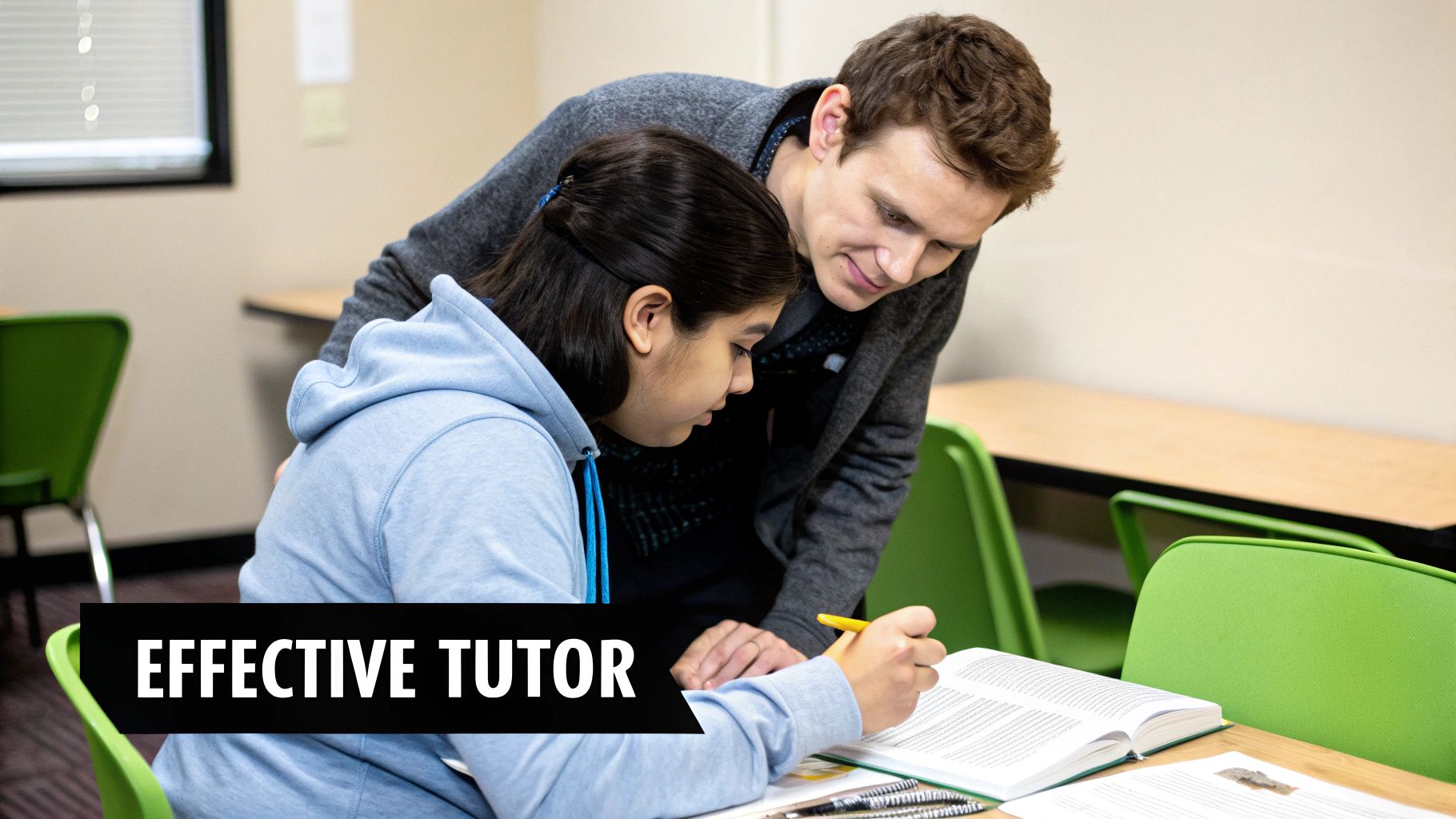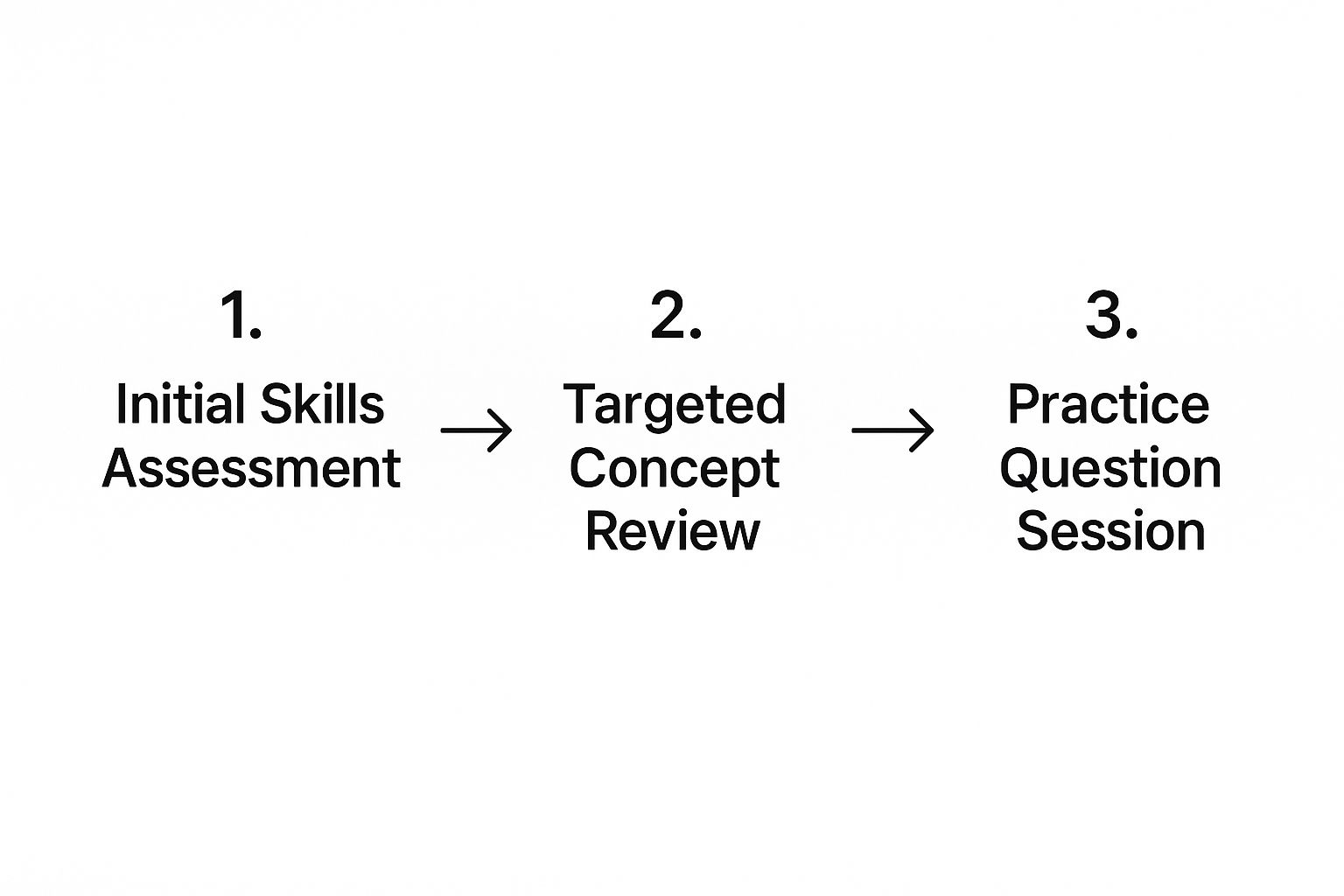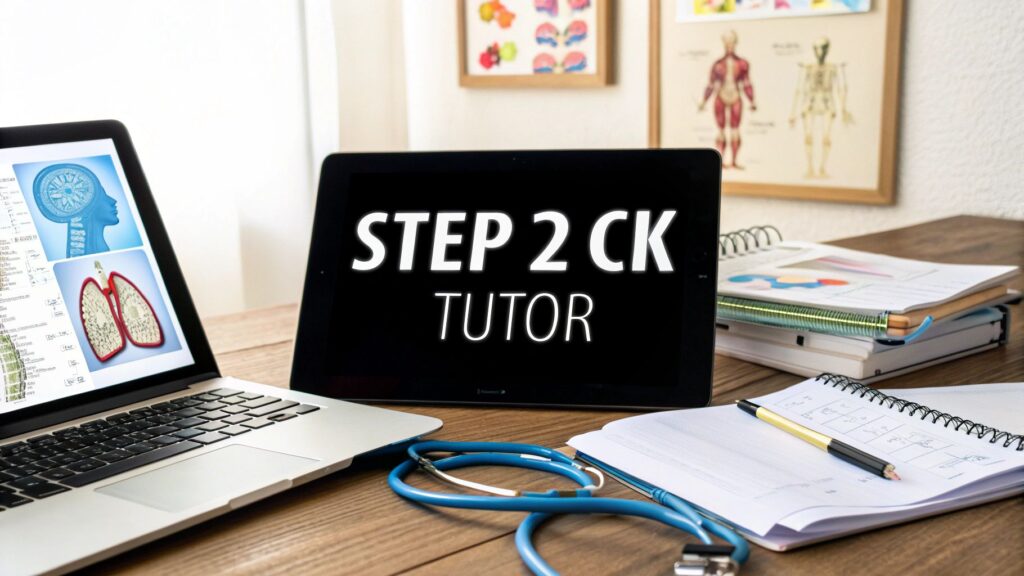A USMLE Step 2 tutor is far more than a simple study aid. Think of them as a strategic partner in a process that will heavily shape your entire residency match. Now that Step 1 is pass/fail, your Step 2 CK score has become one of the most powerful tools in your application, making personalized guidance a true career-defining investment.
Why a Step 2 Tutor Is a Career-Defining Investment

The entire landscape of residency applications has changed. With USMLE Step 1 shifting to pass/fail, that three-digit score on Step 2 CK is no longer just another data point—it's one of the most critical objective metrics you have. For many program directors, it's the very first filter they use to sort through thousands of applicants.
This shift puts a ton of pressure on medical students to do more than just pass; you have to excel. The score you earn directly influences which doors swing open and which stay firmly shut. A great score can make you a standout applicant, while an average one risks getting you lost in the crowd, especially in competitive specialties.
The New Reality of Residency Applications
The increased weight of the Step 2 CK score isn't just a feeling; it's a documented trend. Since the big change with Step 1, program directors have leaned heavily on this exam to gauge a candidate's clinical knowledge. It's often the single data point that determines whether your application gets a thorough review or is screened out before a human ever lays eyes on it.
Just how important is it? A recent survey by the National Resident Matching Program revealed that Step 2 scores ranked as the fourth most commonly considered factor when programs decide which candidates to interview. That statistic alone underscores its critical weight in the process.
Let's break down exactly how a high score can ripple through your application.
How Your Step 2 CK Score Shapes Your Residency Match
A strong Step 2 CK score does more than just look good on paper; it actively works for you at several key stages of the match process. This table illustrates the direct impact your score can have.
| Application Component | Impact of a High Step 2 CK Score |
|---|---|
| Initial Screening | Your application is far more likely to pass automated filters and get reviewed by a program coordinator or director. |
| Interview Invitations | A high score significantly increases your chances of receiving interview invites, especially in competitive specialties or top-tier programs. |
| Away Rotations | Some coveted away rotations (audition electives) use Step 2 scores as a prerequisite, giving you a chance to impress a target program. |
| Scholarship & Research | A stellar score can open doors to research opportunities, fellowships, or scholarships that further strengthen your CV. |
| Final Ranking | When programs create their rank order list, a strong objective measure like your Step 2 CK score helps you stand out among a sea of qualified candidates. |
As you can see, the benefits compound. A great score gets you interviews, which gives you the chance to make a personal connection, which ultimately leads to a higher spot on the rank list.
Investing in a USMLE Step 2 tutor isn't just about preparing for an exam. It’s about investing in a better chance of matching into your dream specialty. It’s a proactive step to take control of a pivotal moment in your medical career.
Going Beyond Simple Test Prep
A top-tier tutor does so much more than just drill high-yield facts. They provide a strategic framework, a game plan tailored specifically to you. This is where the real value lies. A great tutor helps you:
- Identify and Target Weaknesses: They are experts at analyzing your performance on practice questions and self-assessments. They'll pinpoint the specific content gaps or flawed test-taking habits you can't see on your own.
- Optimize Your Study Plan: Instead of just telling you to work harder, a tutor helps you work smarter. They ensure every precious hour of study time is focused on activities that will actually yield the biggest score increase.
- Build Test-Taking Stamina and Confidence: They will simulate exam conditions, teaching you how to manage time, handle the inevitable stress, and approach those long, complex clinical vignettes with a clear, systematic method.
Hiring a USMLE Step 2 tutor is a strategic move to maximize your potential. It’s an acknowledgment that in this high-stakes environment, personalized, expert guidance can be the difference-maker that helps you stand out and achieve your career goals.
Pinpointing Your Unique Tutoring Needs

Before you even start Googling for a usmle step 2 tutor, you have to do some real legwork. Just knowing you're overwhelmed or that your scores aren't where you want them to be isn't enough. That's a symptom, not a diagnosis.
The best tutoring partnerships I've ever seen—the ones that lead to massive score jumps—always start with a student who has already performed a thorough self-audit. It's about shifting your mindset from "I need help" to "Here is precisely where and why I need help."
This means digging into your performance data and moving past vague feelings like "I'm bad at cardiology" or "I'm just too slow." You need to find the root cause of your struggles so you can find a tutor who specializes in fixing that specific problem.
Deconstructing Your Performance Data
Your UWorld and NBME self-assessment reports are goldmines of objective data. Seriously. Stop just looking at the big three-digit number and start dissecting the performance breakdowns by subject, system, and even question type. This is where you'll find your real weaknesses, and they're often not what you think they are.
For instance, you might feel like your neurology knowledge is the problem. But when you dig into the data, you could discover the real issue is interpreting diagnostic imaging—CTs, MRIs, X-rays—across all specialties, from neurology to surgery to medicine. Or maybe you consistently miss pharmacology questions, no matter which clinical topic they're wrapped in.
Look for these patterns:
- Content Gaps: Which subjects are always hanging out below the average performance line? This is the most obvious place to start.
- Question Type Struggles: Are you fumbling questions about the "best next step in management" but acing the "diagnosis" questions? This points to a clinical reasoning gap, not just a knowledge deficit.
- Time Management Breakdowns: Get granular with your timing per block. Are you always rushing through the last 10 questions? This tells you that you don't just need to "go faster"—you need specific strategies for dissecting long question stems and eliminating answer choices efficiently.
Setting Concrete Tutoring Goals
Once you've analyzed your data, you can turn those fuzzy frustrations into sharp, actionable objectives. This clarity is what allows a great tutor to create a truly personalized plan for you. Vague goals get you generic, off-the-shelf tutoring sessions. Precise goals get you real, measurable progress.
The difference between a good and a great tutoring experience is moving from "I need help with medicine" to "I need to improve my endocrinology score by 15 points and cut my average question time by 10 seconds."
Here’s how you can reframe your needs when you start talking to potential tutors:
| Vague Goal | Concrete Goal |
|---|---|
| "I'm not good at surgery." | "I consistently miss questions on post-op complications. I need a framework for building a differential diagnosis in those scenarios." |
| "I run out of time on blocks." | "I get bogged down in long question stems and need a strategy to pull out the key information in under 30 seconds." |
| "I have test anxiety." | "My practice scores are solid, but they drop significantly on full-length exams. I need help with mental stamina and a pre-test routine." |
This level of self-awareness does two critical things.
First, it immediately helps you zero in on the right type of usmle step 2 tutor—someone whose expertise actually matches your challenges. Second, it establishes clear benchmarks for success. This way, both you and your tutor can track your progress and know that your investment of time and money is actually paying off. You're not just hiring help; you're directing a targeted academic intervention.
How to Actually Vet and Choose the Right Tutor

Alright, you’ve done the hard work of diagnosing your weaknesses. Now comes the critical part: finding the right USMLE Step 2 tutor to help you fix them. It's easy to get star-struck by a tutor's 270 score report, but that number tells you almost nothing about their ability to teach, adapt, and communicate complex ideas.
Your mission is to find an exceptional teacher, not just a great test-taker.
The real work happens during the vetting process. This is where you separate the truly effective mentors from those who just look good on paper. You need to go into your consultation calls ready to ask tough, specific questions. Don’t be shy about putting them on the spot—their answers will reveal everything about their teaching style and philosophy.
Essential Questions for Your Tutor Consultation
Think of the consultation call as an interview where you are the one doing the hiring. Don't let them run the show with a generic sales pitch. Come prepared with a list of questions that cut to the heart of their process.
Here are a few powerful questions I recommend asking:
- "Walk me through how you would tackle my weakest subject, which is [Your Weak Subject]." This question forces them to ditch the script and demonstrate their actual teaching method.
- "How do you adapt your approach if a student isn’t improving after a few sessions?" A great tutor has a plan for this. A mediocre one will sound flustered.
- "Can you give me an example of how you helped a past student overcome a specific issue like time management or test anxiety?" This is a direct test of their real-world experience and problem-solving skills.
- "What's your strategy for breaking down long, multi-step clinical vignettes?" This gets right to a core skill needed to crush Step 2 CK.
Listen closely to their answers. Do they sound structured, thoughtful, and personalized? Or are they serving up vague, pre-rehearsed lines? The how is just as important as the what.
A massive red flag is any tutor or company that offers a score guarantee. No one can ethically or practically guarantee a specific score. This is a predatory tactic that preys on student anxiety and usually involves a rigid, one-size-fits-all program that completely ignores your unique needs. Real mentorship is personalized, not pre-packaged.
Independent Tutors vs. Tutoring Companies
As you search, you'll find two main options: independent physician tutors and larger tutoring companies. Each has its own set of pros and cons, and the best fit depends entirely on your budget, learning style, and what you need.
| Feature | Independent Physician Tutor | Tutoring Company |
|---|---|---|
| Personalization | Usually highly personalized. You're working with one person who knows your story inside and out. | Can be more variable. You might be assigned a tutor from a large pool and could see less consistency. |
| Cost | Often more expensive, reflecting their direct expertise and one-on-one attention. | Generally more affordable, with package deals. But always check the individual tutor's qualifications. |
| Resources | Typically limited to the tutor's personal materials and recommendations. | May come with proprietary materials, Q-banks, or a full, structured curriculum. |
| Flexibility | Scheduling is often more flexible and can be tailored directly to your life. | Scheduling may be more rigid or handled through a less personal central system. |
If you're looking for a deeply customized plan and want direct access to an experienced physician, an independent tutor is probably your best bet. If you thrive on structure, want bundled resources, and are working with a tighter budget, a reputable company could be a great choice.
The stakes for Step 2 are sky-high. Over 44,000 examinees take this exam every year, and the data shows that retakers have a much tougher road. Pass rates for retakers are only 74% for US/Canadian MDs and a concerning 61% for international candidates. This just underscores how vital it is to get your prep right the first time around.
Choosing the right guidance is a massive part of that strategy. For a complete game plan, be sure to check out our comprehensive guide on https://acemedboards.com/how-to-study-for-step-2-ck/.
Making Every Tutoring Session Count
So, you’ve hired a great USMLE Step 2 tutor. That’s a fantastic first step. But here’s a reality check I’ve learned from years of working with med students: the real score improvements don't happen during the session. They happen because of what you do before and after.
To get the most out of this investment, you have to shift from being a passive student to an active partner. It's about turning a simple tutoring hour into a powerful, focused collaboration that drives your score up.
Prepare Like a Pro
Your role begins long before you join the video call. You need to walk into every session with a clear agenda built from your recent struggles. Don't just show up and say, "Let's review cardiology." That's too broad and wastes valuable time.
Instead, get specific. Try something like this: "I missed three questions on acute coronary syndrome management in my UWorld block this week. I'm struggling to differentiate the best initial therapy versus the most accurate diagnostic test. Can we work through that algorithm?"
This kind of targeted prep lets your tutor dive straight into your actual weak spots. Bring specific question IDs or screenshots of concepts that are tripping you up.
Here’s how to make your preparation count:
- Be Specific: Instead of a broad topic like "surgery," narrow it down. "Post-op fever on day 3 vs. day 5" is a much more effective starting point.
- Bring Evidence: Have your incorrect answers ready to go. This gives your tutor a direct window into your thought process and helps them pinpoint exactly where you went off track.
- Communicate Openly: If an explanation isn't clicking, speak up! A good tutor is a great teacher, which means they can pivot and explain a concept in multiple ways until it makes sense to you.
The goal is to create a dynamic, structured session that addresses your unique needs, not just a generic lecture. This visual breaks down the ideal flow.

As you can see, the most effective sessions move from a broad assessment of your skills to highly targeted, hands-on practice. It's a structured approach that ensures every minute is spent productively.
Consolidate Your Learning After the Session
The hour after your session ends is just as critical as the session itself. This is your prime window for consolidation—the time when new information moves from your shaky short-term memory into solid long-term storage. Don't just close your laptop and move on.
Your primary goal after a session is to immediately apply what you've learned. This active recall is what makes new information stick. Don't let those "aha" moments fade away.
Right away, create 5-10 Anki cards based on the highest-yield points from your discussion. If you went over a tricky clinical algorithm, grab a whiteboard and draw it out from memory.
Then, the final piece: do a small, targeted block of 10-15 UWorld questions on that exact topic. This immediately tests your new understanding in an exam context, cementing the knowledge.
This simple cycle—targeted prep, active participation, and immediate consolidation—is what separates students who see marginal gains from those who achieve major score jumps. It transforms your USMLE Step 2 tutor from a resource into a strategic multiplier for all your hard work.
Integrating Tutoring into Your Study Workflow
So, you’ve decided to hire an expert. That’s a great first step, but it's just one piece of the puzzle. The real magic happens when you treat your USMLE Step 2 tutor as a strategic partner who fits into your study plan—not as a replacement for core resources like UWorld and NBME self-assessments.
Think of your tutor as your personal performance analyst and guide, not your sole source of knowledge. Your study week is a delicate ecosystem. It needs a healthy balance of independent work, targeted practice, and expert feedback to really thrive. If you lean too heavily on your tutor, you risk developing a passive learning crutch. But if you don't use them strategically, you're leaving high-level insights on the table.
Building a Sustainable Weekly Schedule
One of the most common mistakes I see students make is trying to cram tutoring sessions into an already overflowing schedule. This is a fast track to exhaustion. A much better approach is to build your study schedule around your sessions. This simple shift ensures you have enough time to prepare beforehand and, just as importantly, to consolidate what you learned afterward. It’s all about preventing burnout and making every single study hour count.
Here’s what a smart, balanced tutoring day might look like mid-week:
- Morning (Active Learning): Knock out one timed, random 40-question UWorld block. This gets your brain warmed up and, crucially, generates fresh data for your upcoming session.
- Late Morning (Analysis & Prep): Go through that block with a fine-tooth comb. Your goal here is to pinpoint 3-5 specific questions or concepts that gave you the most trouble. These become the agenda for your tutoring session.
- Afternoon (Tutoring Session): Dive into your one-hour session, laser-focused on the agenda you prepared. This isn’t a lecture; it’s a high-level problem-solving workshop where you refine your strategy.
- Late Afternoon (Consolidation): Right after the session, while the information is fresh, create Anki cards for the biggest takeaways. Then, do a short, 10-15 question UWorld block focused specifically on the topic you just covered to lock in your new understanding.
This kind of structure transforms your tutor from a simple lecturer into a powerful collaborator. You can also explore other effective study methods for medical students to enhance both your tutoring sessions and independent study time.
Your Tutor as a Data Analyst
Here's where a great tutor really earns their keep: using them as a data analyst for your NBME reports. Don't just show them your final three-digit score; hand over the entire performance breakdown. An experienced tutor can look at those performance graphs and see a story you might completely miss. They can translate that raw data into a high-yield, focused action plan for the next few weeks.
Your NBME score report isn't a final grade; it's a diagnostic tool. A skilled tutor will dissect it to identify patterns, pinpoint high-yield weaknesses, and build a targeted plan that directly addresses your lowest-performing areas.
This data-driven approach is more critical now than ever. The USMLE Management Committee recently announced that the passing standard for Step 2 CK is increasing from 214 to 218, effective July 1, 2025. You can see the full announcement on the USMLE website. This change underscores the exam's evolving focus on clinical competency. With the bar being raised, having a strategic, data-informed study plan isn't just a good idea—it's essential.
By weaving tutoring into a realistic and balanced routine, you make sure that every hour you spend studying is purposeful. If you need more help building out your calendar, take a look at our sample Step 2 CK study schedule for a complete template.
Common Questions About USMLE Step 2 Tutors
Deciding to hire a USMLE Step 2 tutor is a big move, so it's only natural to have a few questions swirling in your head. Getting clear, straightforward answers will help you move forward with confidence and make sure you find a partner who fits your timeline, budget, and learning style.
Let's break down some of the most common things students want to know.
How Many Tutoring Hours Do I Really Need?
This is the big one, and the honest answer is: it depends. There's no magic number. The right amount of time is completely tied to your personal situation—where you're starting from (your baseline practice score), what score you're aiming for, and how much runway you have before test day.
A diagnostic session is the perfect way to figure this out. For most students, 1-2 hours per week over a 4-8 week period is a real sweet spot. This rhythm gives you enough time for targeted teaching and, just as importantly, allows you to put those new strategies into practice during your independent study.
However, if you're retaking the exam or have some serious content gaps to fill, you might need a more intensive schedule. The key is to see your tutor as a strategic guide for your own work, not just someone who delivers content.
Is an Online Tutor as Effective as In-Person?
Absolutely. In many ways, online tutoring is actually more effective.
Modern tutoring platforms have some incredible tools that you just don't get in person, like shared digital whiteboards for working through tough questions together. Plus, you get session recordings you can review anytime. Being able to re-watch a complex explanation on your own time is a game-changer.
Ultimately, what matters most is the quality and teaching ability of the tutor, not the medium. A phenomenal online instructor who "gets" your learning style is always going to be more valuable than a mediocre local tutor you meet at a coffee shop. And let's be honest, the scheduling flexibility alone makes it a better fit for a med student's chaotic life.
What Is a Reasonable Price for a Quality Step 2 Tutor?
Tutoring rates can be all over the map. You'll find peer tutors charging around $50 per hour, while elite physician educators might command rates north of $250 per hour.
A typical sweet spot for an experienced, high-quality USMLE Step 2 tutor falls in the $80-$150 per hour range. Be wary of prices that seem too good to be true—they often reflect a lack of experience or a generic, one-size-fits-all approach.
Think of this as an investment in your medical career. Instead of focusing only on the hourly rate, consider the value and expertise the tutor provides. It's also always worth asking if they offer a discount for purchasing a package of sessions.
When Is the Best Time to Start Working with a Tutor?
Timing is everything if you want to get the most out of tutoring. The ideal window to kick things off is usually 4-8 weeks before your exam date.
This timeline hits the perfect balance. You'll want to start after you have a baseline score from a practice test (like an NBME or UWSA). This gives both you and your tutor hard data to work with from day one.
Starting too early can be inefficient, but beginning in the final week or two is just too late to make any real strategic shifts. The goal is to give yourself enough time to identify weaknesses with your tutor and then actively work on fixing them—all while avoiding the intense pressure that leads to USMLE exam burnout.
At Ace Med Boards, our expert tutors are ready to help you create a personalized plan to crush your Step 2 CK exam. We focus on turning your weaknesses into strengths and building the confidence you need for test day. Schedule your free consultation today!

